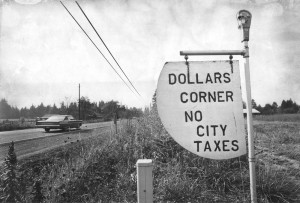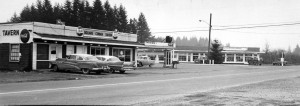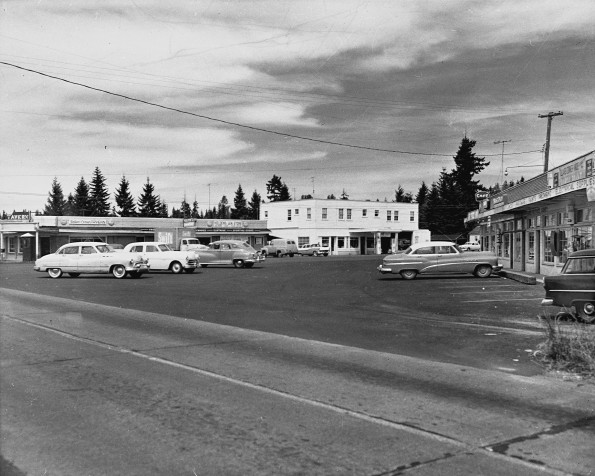In 1979 the newspaper wrote:
The Dollars Corner community, around the intersection of Northeast 72nd Avenue and 219th Street, is not incorporated and has no mayor to speak for it. However, Jim Rodda, president of the Dollars Corner Boosters Club, is the next best thing to a genuine mayor.
There are about 32 business firms in Dollars Corner, Rodda said, and many of the businessmen would like to see themselves armed with the political muscle incorporation would bring.
 “If we don’t do something pretty soon, it will be too late,” said Rodda, who operates an automobile body shop. He explained the business community is dissatisfied with the attitude of county planners toward the future growth of the community that lies two miles due west of Battle Ground.
“If we don’t do something pretty soon, it will be too late,” said Rodda, who operates an automobile body shop. He explained the business community is dissatisfied with the attitude of county planners toward the future growth of the community that lies two miles due west of Battle Ground.
While many of Clark County’s smaller communities are being swallowed up by urban sprawl and losing their identity, Dollars Corner has never been healthier.
To Joe Hernandez, sales associate at Worden’s Realty, the future of Dollars Corner is as bright as the sun’s rays dancing off the water of nearby Patterson’s Swale.
“This is where the action is,” Hernandez said enthusiastically. “This is where people want to live.”
Hernandez pointed to the growth of the real estate firm itself as an example of what is happening in Dollars Corner. Worden’s Realty was founded nine years ago by Stan Worden who died October 1978. The firm was born in a tiny meat market across 72nd Avenue from the modern building that now houses the offices of what Hernandez claims is the county’s fourth largest real estate firm.
The residential growth generally is north, toward Daybreak, he said. Most of the new homes are expensive ranch-style houses built on one to five acres.
Land, Hernandez said, is running as much as $8,000 an acre, especially those properties that command a view of Mount St. Helens and Mount Hood.
“We’re just 16 to 18 minutes from the Interstate Bridge,” Hernandez said. “This is where people want to live.”
 Just more than one-half century ago, Dollars Corner was composed entirely of fir trees and dairy farms. It was in 1917 that Mr. and Mrs. S.L. Dollar moved to a farm in the area. In about 1924, they purchased land and built a small gasoline station on the northeast corner of the intersection.
Just more than one-half century ago, Dollars Corner was composed entirely of fir trees and dairy farms. It was in 1917 that Mr. and Mrs. S.L. Dollar moved to a farm in the area. In about 1924, they purchased land and built a small gasoline station on the northeast corner of the intersection.
According to a son, Dollar traded two cows and $150 for the property around which the thriving community was to grow.
The name was provided by sheriff’s deputies who used to patrol out as far as the service station. They reported back to their superiors they had gone “as far as Dollar’s corner.” Eventually, the people of the area accepted the name, dropping the apostrophe.
Rodda said if incorporation becomes a fact, the name Dollars Corner probably will be retained.
Not everyone in the community is looking for growth and incorporation, however. Jim Roberts, the community barber, owns and operates a tonsorial parlor called The Bushwacker. When he isn’t cutting hair or trimming beards, Roberts can be seen sitting on a bench in front of his shop, talking with passersby.
“Everyone here knows everybody else,” Roberts said. “I like it just the way it is.”
In addition to pondering incorporation, the people of the community have been engaged in a running battle with state officials in an attempt to get a traffic signal at the intersection. At present, only a blinker light controls the steady flow of traffic.
“We see an average of a wreck a week at this intersection,” said Roberts, who added a petition with a 1,000 signatures was sent to Gov. Dixy Lee Ray after highway officials turned down the signal.
However, the governor’s response to the petition was less than enthusiastic.
“Unfortunately, petitions by themselves are not revenue generators and do little to provide funding for needed projects,” Gov. Ray said in a letter that was posted on a bulletin board at O’Brady’s Drive-in.
However, Rodda said, the governor was reminded that petitions do represent votes, if not dollars. He said he understands the traffic light will be installed this summer.
